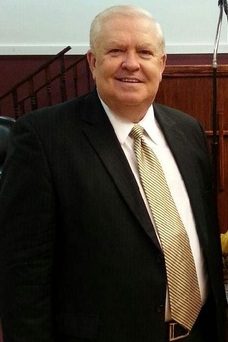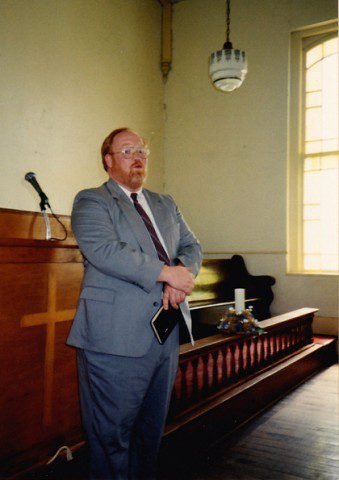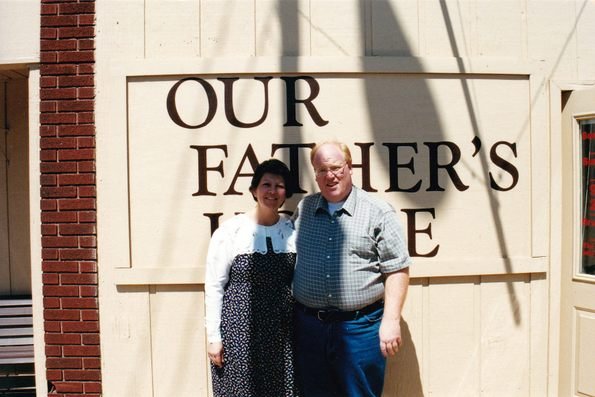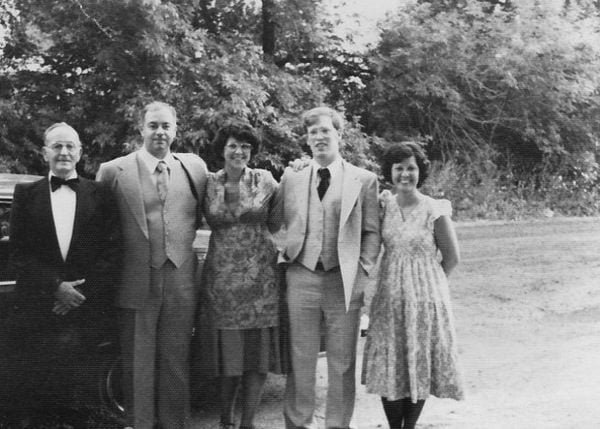Bruce Turner was my youth pastor in the early 1970s. Bruce played a very influential part in my life, from my profession of faith in Christ to my call to the ministry. I originally published this letter in 2014. As with the previous letters I have posted, I want this letter to be a part of the historical narrative of my life.
Dear Bruce,
I see you found my blog. I am sure the current state of my “soul” troubles you. My “spiritual” condition troubles many as they try to wrap their theological minds around my twenty-five years in the ministry and my present atheistic views.
I plan to address the comment you left at the end of the letter, but before I do so I want to talk about the relationship you and I had and the influence you had on my life.
You came to Trinity Baptist Church in Findlay, Ohio, fresh out of Baptist Bible College. Trinity was looking to hire a full-time youth pastor and you were the one they hired. You joined the staff of a busy, growing Independent Fundamentalist Baptist (IFB) church.
You were there when I put my faith and trust in Jesus. You were there when I was called to preach. You helped me prepare my first sermon (2 Corinthians 5:20). You and I worked a bus route together and went out on visitation.
My parents had recently divorced and you became a surrogate father to me. When my Dad remarried and moved us to Arizona I was devastated. In a few months, I returned to Ohio, and in the late summer of 1973, I moved from Bryan to Findlay.
You helped me find a place to live, first with Bob and Bonnie Bolander, and then with Gladys Canterbury. For almost a year I went to school, worked a job at Bill Knapp’s, and immersed myself in the ministry of Trinity Baptist Church. You were there to guide me every step of the way.
When I first moved to Findlay, a divorcee and her young daughter wanted to take me in. You wisely made sure that didn’t happen, knowing such a home would not be healthy for me.
When I became enamored with Bob Harrington (I loved his “It’s Fun Being Saved” record) you warned me about worshiping big-name preachers. You told me to pay attention not only to what they preached but what they didn’t.
You even catered to my personal desires. In the summer of 1973, I had a whirlwind romance with Charlotte Brandenburg. Charlotte was the daughter of the couple who came to hold a Super Summer Bible Rally (VBS) at Trinity. For one solid week, we spent every day with each other. I was smitten with Charlotte.
Later that same year you planned a youth outing to the Troy Baptist Temple, the church Charlotte attended. We went to see the movie, A Thief in the Night, but my real reason for going was to see Charlotte.
When it came time to leave, I lingered as long as possible — I didn’t want to leave Charlotte. Finally, I heard a voice that said, Gerencser, get on the bus (for some reason you liked to call me by my last name). As I came hand-in-hand with Charlotte to the bus you turned away for a moment and told me to get it over with. I quickly kissed Charlotte goodbye and that was the last time I saw her. We wrote back and forth for a few months but, like all such relationships, ours died due to a lack of proximity.
You were my basketball coach. Trinity sponsored a team in the ultra-competitive high school Church Basketball League. One game I had a terrible night shooting the ball. I was frustrated and I told you I wanted out of the game. You refused and made me play the whole game. My shooting didn’t get any better but I learned a life lesson that I passed on to all my children years later.
I remember when this or that person in the youth group got in trouble. You and Reva were there to help them pick up the pieces of their lives. You were a kind, compassionate man.
I remember you helping us get a singing group started. I still remember singing the song Yesterday during a church service (YouTube video of Cathedral Quartet singing this song). I also remember you singing Fill My Cup Lord. Polly and I sang this same song for many years in most every church I pastored.
Who can ever forget your Youth Group survey? You anonymously surveyed our attitudes about alcohol, drugs, music, and sex and then you dared to use your findings in a sermon. I remember what a stir your sermon caused. You peeled back the façade and revealed that many of the church’s youth were not unlike their non-Christian peers.
I saw your bad side too. I remember the youth canoe outing where Reva lost her teeth. Boy were you angry. I felt bad for Reva, but in a strange way, I loved you even more. I saw that you were h-u-m-a-n. I already knew Gene Milioni and Ron Johnson, the other pastors, were human, having seen their angry outbursts, and now you were mortal too. (Remember I am writing this from the perspective of a fifteen-year-old boy.)
In May of 1974, I abruptly left Findlay, one week away from the end of school (a move that resulted in Findlay High School denying me credit for my entire 11th-grade year). Subsequently, I dropped out of high school. My Mom was in a world of hurt mentally and she needed me (and I needed her). In the fall of 1974, she would be admitted to the state mental hospital and my Dad would come to Ohio and move my siblings and me back to Arizona.
In 1976 I enrolled at Midwestern Baptist College in Pontiac, Michigan. I met my wife at Midwestern, and after leaving there in the Spring of 1979, we embarked on a twenty-five-year journey in the pastorate, a journey that took us to seven churches.
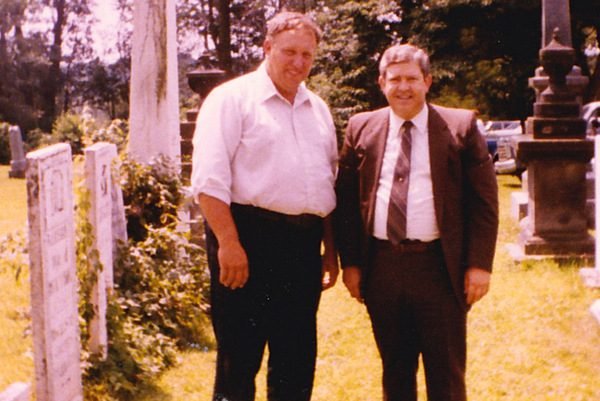
In 1983, I started the Somerset Baptist Church in Somerset, Ohio. I put to use the things I learned from you, Dr. Tom Malone, and my professors at Midwestern. I put soul-winning first. I committed myself to being a faithful preacher of the truths found in the King James Bible. And “God” blessed the work I did. Somerset Baptist Church grew from a handful of people to over two hundred. We were the largest non-Catholic church in Perry County.
You and I reconnected and I had you come and preach for us. I believe it was a special service and the church was packed with people. The people loved you and I was thrilled to show off my mentor to them. I suppose, deep down, I needed your approbation.
You invited me to come and preach at your church, Braintree Baptist Temple in Braintree, Massachusetts. I now know that the real reason you had me come and preach was that you saw some things that concerned you. My workaholic, Type-A personality was good for growing a church but not so good for me or my family. Sadly, it took me many more years before I realized this.
We stayed in your home in Massachusetts and spent a few days traveling around the area. This was the first “vacation” our family had ever taken and it would be the last one for many years. I was too busy and thought I was too important to take any time off. Even when I later took vacations, I never took them just to be taking one. I always had a church or conference to preach at while we were on “vacation.”
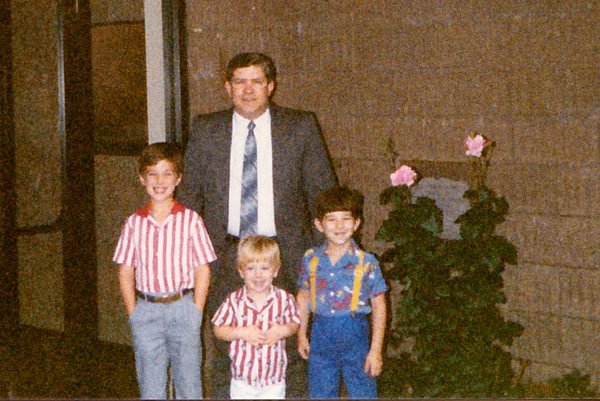
You and your dear wife treated us well. You gave us some “run-around” money and we went out to the Cape. My oldest children still remember dipping their feet in the cold waters of the Atlantic.
We parted, promising to keep in touch, but as with Charlotte and me years ago, our relationship died due to a lack of proximity. I suspect my later adoption of Calvinism ended any chance of a continued relationship.
I did write you several times in the 1990s. I read somewhere that you had Fibromyalgia, and when I was diagnosed with the same, I wrote you. You never responded. I was disappointed that you never wrote back, but I chalked it up to you being busy.
Bruce, I wrote all of this to say that you had a profound effect on my life. I will always appreciate what you did for me.
Now to your comment.
Sorry to see your blog and obvious bitterness toward Baptists. Not all of us preached an easy believing Gospel and certainly not all of us lived a perverted life. These King makers you blog about have never had my respect.
Reva and I have been happily married for 44 years. I am sorry your health is so bad and though you apparently have rejected what you once professed, I am praying for you to the God (not preachers) that I trust.
I sincerely hope your health improves and remember some good times in the old days. Stay healthy friend.
Bruce Turner
I am often accused of being bitter, angry, or some other negative emotion. On one hand, I have every reason to be bitter and angry, but my rejection of Christianity is not ultimately defined by anger or bitterness.
I rejected Christianity because I no longer believe the claims made about the Bible and its teachings. I came to see that the Bible was not inerrant or infallible. I came to see that belief in the God of the Bible could not be rationally sustained (this is why faith is necessary), and even if it could be, I wanted nothing to do with such a capricious, vengeful, homicidal God. I later came to see that the supernatural claims for Jesus could not be sustained either. While I certainly think a man named Jesus roamed the Judean hillside during the time period recorded in the Bible, the miracle-working Jesus of the Bible is a myth. At best he was a revolutionary, a prophet who was executed for his political and religious beliefs (and I still, to this day, have a real appreciation for the sermon on the Mount and a few other sayings attributed to Jesus).
My journey away from Christianity and the ministry took many anguish-filled years. I didn’t arrive where I am today overnight. I looked at progressive Christianity, the Emergent church, liberal Christianity, and even universalism. None of these met my intellectual needs. None of them rang true to me. I made many stops along the slippery slope until I came to the place where I had to admit that I was an atheist (and I still think saying I am a Christian means something).
I am not a hater of Christianity. I have no desire to stop people from worshiping the Christian God. I am well aware of the need many people have for certainty. They want to know their life matters and they want to know that there is life beyond the grave. Christianity meets their need. Who am I to stand in the way of what helps people get through life? It matters not if it is true. They think it is true and that is fine by me.
The Christianity I oppose is the Evangelical form of Christianity that demands everyone worship their God, believe what they believe, and damns to Hell all those who disagree with them. I oppose their attempts to turn America into a theocracy. I oppose their hijacking of the Republican Party. I oppose their incessant whining about persecution and their demands for special status. I oppose their attempts to deny some Americans of the civil and legal rights others have. (What happened to Baptists believing in a strict separation of church and state?) I oppose their attempt to infiltrate our public schools and teach Creationism or its kissing cousin, Intelligent Design, as science (this is what Christian schools are for). I oppose their attempt to make the Ten Commandments the law of the Land.
The kind of Christianity I mentioned above hurts people and hurts our country politically and socially. The Independent Fundamentalist Baptist (IFB) church movement has harmed countless people, sometimes scarring their lives so severely that recovery is almost impossible (and telling people to get over it is not the answer). I weep often as I read emails from people whose lives have been destroyed by the extremes found in the IFB church movement. My blog exists because I want to help people like this. I want them to have a safe place to work through the wreckage of their lives, lives ruined by their involvement in Evangelical and IFB churches.
In many ways, I am still a pastor. I want to help other people. The difference now, of course, is that I don’t have an agenda. I don’t have a list “truths” that must be believed. If I can help people walk the journey they are on with openness, honesty, and integrity, I am happy. I am concerned with their journey, not their destination (since I think we are all headed for the same final destination, death).
I too, Bruce, have prayed thousands of times to the Christian God, and yet, like the universe itself, he yawns and remains silent. Instead of hoping for a God to fix what ails me, I have chosen to embrace my life as it is. I have chosen to try to change what I can and accept what I can’t. Above all, I have learned that it is what it is.
Through this blog, I try to flesh out my understanding of the past and examine the path I am now on. I try to be open and honest. I don’t have all the answers and, for that matter, I don’t even know all the questions. All I know to do is continue to walk forward, however halting my gait may be.
I shall always remember our days in Findlay and I will always appreciate what you did for me. When I write my autobiography someday, there will be a chapter titled Bruce Turner.
Thank you.
Bruce Gerencser
